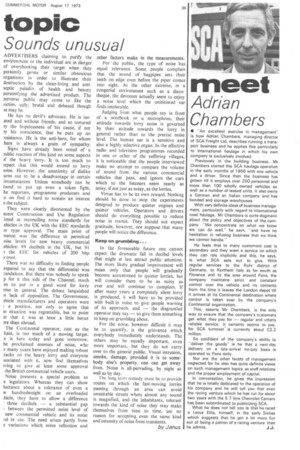topic
Page 41

If you've noticed an error in this article please click here to report it so we can fix it.
Sounds unusual
ADVERTISERS claiming to purify the environment or the individual are in danger of overshooting their target when they personify germs or similar obnoxious organisms in order to illustrate their destruction by the clean-living and antiseptic paladin of health and beauty personifying the advertised product. The perverse public may come to like the victim, ugly, brutal and debased though le may be.
He has no devil's advocate. He is isoated and without friends, and so tortured )y the hopelessness of his cause, if not ry his conscience, that he puts up no -esistance. He is the anti-hero, for whom here is always a grain of sympathy.
Signs have already been noted of a mblic reaction of this kind on some aspects f the heavy lorry. It is too much to :xpect that this would extend to lorry wise. However, the unanimity of dislike urns out to he a disadvantage in certain ircumstances. Unless somebody can be bund to put up even a token fight, he reporters, programme producers and o on find it hard to sustain an interest
n the subject. • They were clearly disoriented by the ecent Construction and Use Regulation imed at reconciling noise standards for chicks in the UK with the EEC standards attype approval. The main point of iterest was the difference in permitted oise levels for new heavy commercial chicks: 89 decibels in the UK, but 91 the EEC for vehicles of 200 bhp r over.
There was no difficulty in finding people repared to say that the differential was :andalous. But there was nobody to speak p for it this side of the Channel, much ;ss to put in a good word for lorry oise in general. The debate languished w lack of opposition. The Government, !hick manufacturers and operators were a position, not only to agree that Le situation was regrettable, but to point at that it was at least a little better 3re than abroad.
The Continental operator, cast as the Ilain, is too much of a moving target.
• e is here today and gone tomorrow. he proclaimed enemies of noise, who T many years have enjoyed making robust tacks on the heavy lorry and everyone ;sociated with it, now find themselves wing to give at least some approval the British commercial vehicle users.
Noise presents a special problem to e legislators. Whereas they can show luctance about a tolerance of even a w hundredweight on an overloaded hick, they have to allow a difference ' three decibels — a substantial gap between the permitted noise level of new commercial vehicle and its noise rel in use. The need arises partly from e variations which noise reflection and other factors make in the measurements.
For the public, the type of noise has equal relevance. Some people complain that the sound of bagpipes sets their teeth on edge even before the piper comes into sight. At the other extreme, in a congenial environment such as a discotheque, the devotees actually seem to enjoy a noise level which the uninitiated ear finds intolerable.
Judging from what people say in front of a notebook or a microphone, their attitude towards lorry noise is governed by their attitude towards the lorry in general rather than to the precise noise level. The human ear is a sensitive and also a highly selective organ. In the effective radio and television programmes recorded in one or other of the suffering villages, it is noticeable that the people interviewed make no attempt to compare the volume of sound from the various commercial vehicles that pass, and ignore the cars which to the listeners seem nearly as noisy, if not just as noisy, as the lorries.
Virtue has to be its own reward. Nothing should be done to stop the experiments designed to produce quieter engines and quieter vehicles. Operators and drivers should do everything possible to reduce noise in transit. They should not expect gratitude, however, nor suppose that many people will notice the difference.
Keep on grumbling ...
In the foreseeable future one cannot expect the dramatic fall in decibel levels that might at last attract public attention. The more likely gradual improvement will mean only that people will gradually become accustomed to quieter lorries, but will consider them to be as noisy as ever and will continue to complain. If after many years a completely silent lorry is produced, it will have to be provided with built-in noise to give people warning of its approach. and — the disgruntled operator may say — to give them something to keep on grumbling about.
For the noise, however difficult it may be to quantify, is the grievance which everybody immediately understands. The others may be equally important, even more important,, but they do not carry over to the general public. Visual intrusion, smoke, damage, provided it is to somebody else's property, one can get away from. Noise is all-pervading, by night as well as by day.
The long-term remedy must be to provide routes on which the fast-moving lorries passing through an area can avoid unsuitable streets where almost any sound is magnified, and the inhabitants, tolerant towards the kind of noise they may make themselves from time to time, see no reason for accepting even the same kind and intensity of noise from transients.
by Janus
































































































